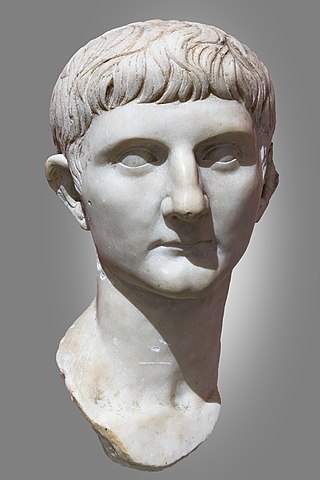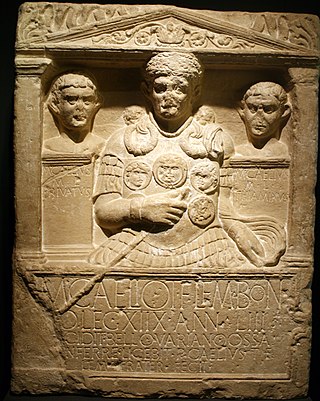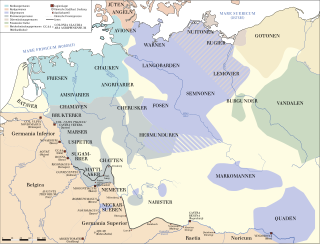
Germanicus Julius Caesar was an ancient Roman general and politician most famously known for his campaigns in Germania. The son of Nero Claudius Drusus and Antonia the Younger, Germanicus was born into an influential branch of the patrician gens Claudia. The agnomen Germanicus was added to his full name in 9 BC when it was posthumously awarded to his father in honor of his victories in Germania. In AD 4 he was adopted by his paternal uncle Tiberius, himself the stepson and heir of Germanicus' great-uncle Augustus; ten years later, Tiberius succeeded Augustus as Roman emperor. As a result of his adoption, Germanicus became an official member of the gens Julia, another prominent family, to which he was related on his mother's side. His connection to the Julii Caesares was further consolidated through a marriage between him and Agrippina the Elder, a granddaughter of Augustus. He was also the father of Caligula, the maternal grandfather of Nero, and the older brother of Claudius.

The Battle of the Teutoburg Forest, described as the Varian Disaster by Roman historians, was a major battle between Germanic tribes and the Roman Empire that took place at modern Kalkriese from September 8–11, 9 AD, when an alliance of Germanic peoples ambushed Roman legions and their auxiliaries, led by Publius Quinctilius Varus. The alliance was led by Arminius, a Germanic officer of Varus's auxilia. Arminius had acquired Roman citizenship and had received a Roman military education, which enabled him to deceive the Roman commander methodically and anticipate the Roman army's tactical responses.

Arminius was a chieftain of the Germanic Cherusci tribe who is best known for commanding an alliance of Germanic tribes at the Battle of the Teutoburg Forest in AD 9, in which three Roman legions under the command of general Publius Quinctilius Varus were destroyed. His victory at Teutoburg Forest precipitated the Roman Empire's permanent strategic withdrawal from Germania Magna, and modern historians regard it as one of Rome's greatest defeats. As it prevented the Romanization of Germanic peoples east of the Rhine, it has also been considered one of the most decisive battles in history and a turning point in human history.

The Cherusci were a Germanic tribe that inhabited parts of the plains and forests of northwestern Germany in the area of the Weser River and present-day Hanover during the first centuries BC and AD. Roman sources reported they considered themselves kin with other Irmino tribes and claimed common descent from an ancestor called Mannus. During the early Roman Empire under Augustus, the Cherusci first served as allies of Rome and sent sons of their chieftains to receive Roman education and serve in the Roman army as auxiliaries. The Cherusci leader Arminius led a confederation of tribes in the ambush that destroyed three Roman legions in the Teutoburg Forest in AD 9. He was subsequently kept from further damaging Rome by disputes with the Marcomanni and reprisal attacks led by Germanicus. After rebel Cherusci killed Arminius in AD 21, infighting among the royal family led to the highly Romanized line of his brother Flavus coming to power. Following their defeat by the Chatti around AD 88, the Cherusci do not appear in further accounts of the German tribes, apparently being absorbed into the late classical groups such as the Saxons, Thuringians, Franks, Bavarians, and Allemanni.

Publius Quinctilius Varus was a Roman general and politician under the first Roman emperor Augustus. Varus is generally remembered for having lost three Roman legions when ambushed by Germanic tribes led by Arminius in the Battle of the Teutoburg Forest, whereupon he killed himself.

Legio XIV Gemina was a legion of the Imperial Roman army, levied by Julius Caesar in 57 BC. The cognomen Gemina (Twinned) was added when the legion was combined with another understrength legion after the Battle of Actium. The cognomen Martia Victrix was added following their service in the Pannonian War c. AD 9 and the defeat of Boudicca in AD 61. The emblem of the legion was the Capricorn, as with many of the legions levied by Caesar.

Drusus Julius Caesar was the son of Emperor Tiberius, and heir to the Roman Empire following the death of his adoptive brother Germanicus in AD 19.
Segestes was a nobleman of the Germanic tribe of the Cherusci involved in the events surrounding the Roman attempts to conquer northern Germany during the reign of Roman Emperor Augustus.

Thusnelda was a Germanic Cheruscan noblewoman who was captured by the Roman general Germanicus during his invasion of Germania. She was the wife of Arminius. Tacitus and Strabo cite her capture as evidence of both the firmness and restraint of Roman arms.

The Angrivarii were a Germanic people of the early Roman Empire, who lived in what is now northwest Germany near the middle of the Weser river. They were mentioned by the Roman authors Tacitus and Ptolemy.

Arminio is an opera composed by George Frideric Handel. The libretto is based on a libretto of the same name by Antonio Salvi, which had been set to music by Alessandro Scarlatti. It is a fictionalisation of events surrounding the Germanic leader Arminius, who defeated the Romans under Publius Quinctilius Varus at the Battle of the Teutoburg Forest in AD 9, and his wife Thusnelda. The opera was performed for the first time at the Covent Garden Theatre on 12 January 1737.

Thumelicus was the only son of the Cherusci leader Arminius and his wife Thusnelda, daughter of the pro-Roman tribal leader Segestes.

Colonia Claudia Ara Agrippinensium was the Roman colony in the Rhineland from which the city of Cologne, now in Germany, developed.
Aulus Caecina Severus was a Roman politician and general who was consul in 1 BC. He was Emperor Augustus' representative in Moesia when the Great Illyrian Revolt broke out. As a result, he spent 4 years in heavy fighting against the Illyrian tribes before the revolt was suppressed by the Romans. In 14 AD he was in charge of several legions on the lower Rhine which mutinied on the death of Augustus. He was recorded as having handled this poorly, with the situation only being salvaged by the intervention of his commander-in-chief, Germanicus.

The Roman campaigns in Germania were a series of conflicts between the Germanic tribes and the Roman Empire. Tensions between the Germanic tribes and the Romans began as early as 17/16 BC with the Clades Lolliana, where the 5th Legion under Marcus Lollius was defeated by the tribes Sicambri, Usipetes, and Tencteri. Roman Emperor Augustus responded by rapidly developing military infrastructure across Gaul. His general, Nero Claudius Drusus, began building forts along the Rhine in 13 BC and launched a retaliatory campaign across the Rhine in 12 BC.
Italicus was a chieftain of the Germanic Cherusci. He is chiefly remembered as the nephew of Arminius.
Segimer or Sigimer was a chieftain of the Germanic Cherusci tribe. He is chiefly remembered as the father of Arminius, who led the Germans to victory over the Romans at Teutoburg Forest in AD 9.
Mallovendus was a chieftain of the Germanic Marsi.
The Battle of the Angrivarian Wall was fought near Porta Westfalica, Germany in 16 AD between the Roman general Germanicus and an alliance of Germanic tribes commanded by Arminius. This battle followed immediately after the Battle of Idistaviso, and was supposedly sparked by Germanic outrage over the trophy erected on that prior battlefield by the Romans.

Barbarians is a 2020 German historical war drama television series created by Andreas Heckmann, Arne Nolting, and Jan Martin Scharf. It stars Laurence Rupp, Jeanne Goursaud, and David Schütter. The series is a fictionalized account of events during the Roman Empire's occupation of Germania, and the resulting rebellion of the Germanic tribes led by Arminius. The series was renewed for season 2 on November 10, 2020. It was released on Netflix on October 21, 2022.











